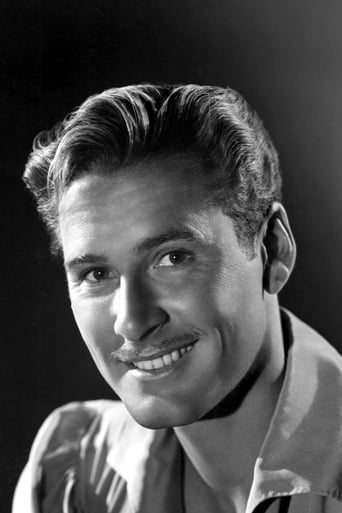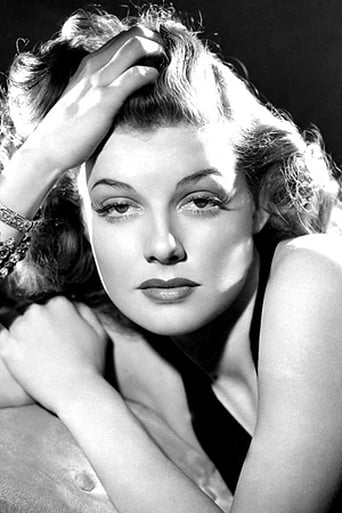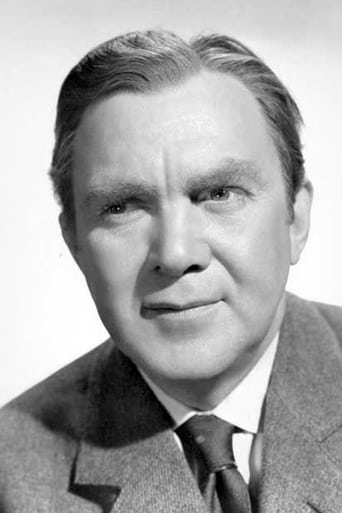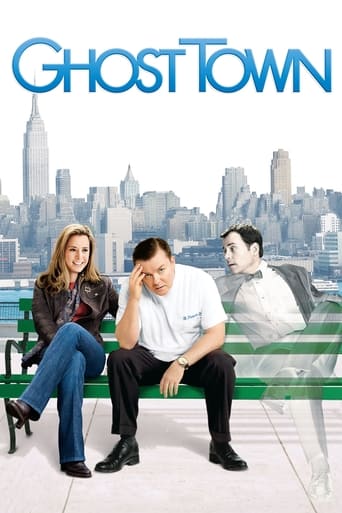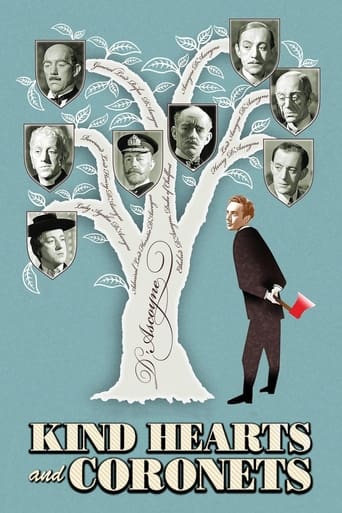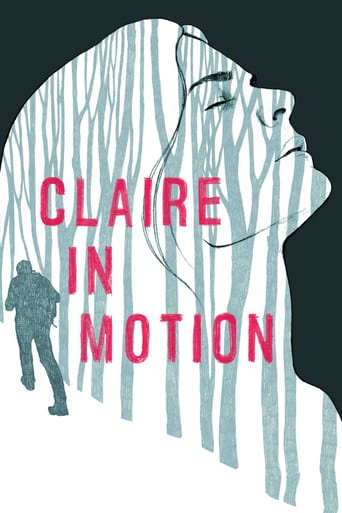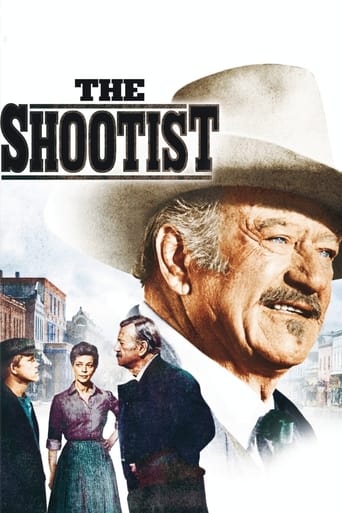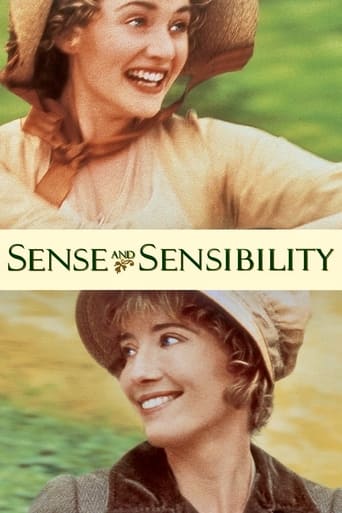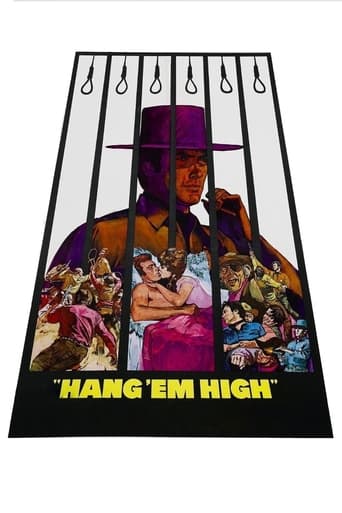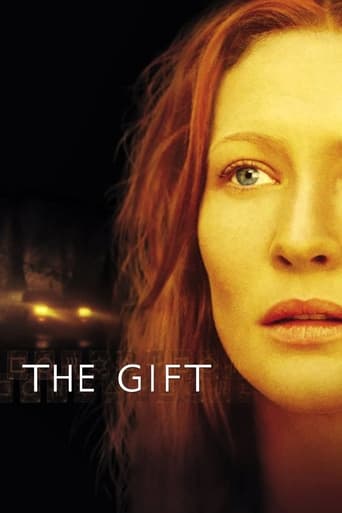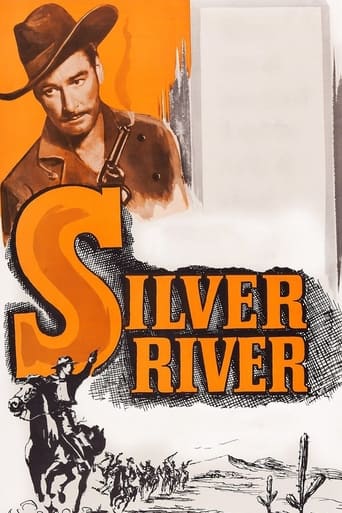
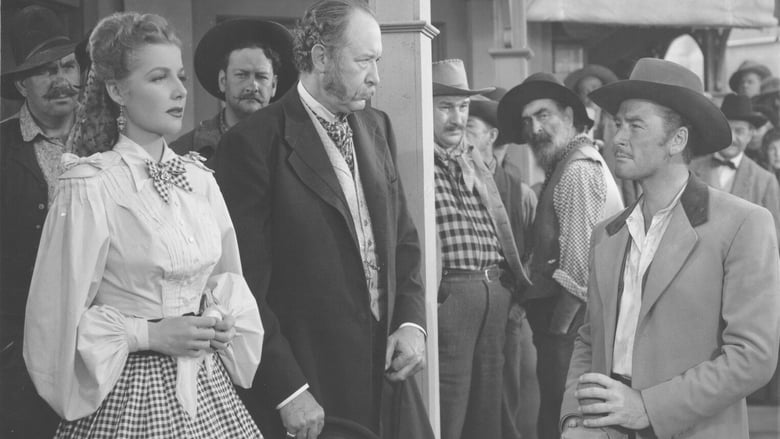
Silver River (1948)
Unjustly booted out of the cavalry, Mike McComb strikes out for Nevada, and deciding never to be used again, ruthlessly works his way up to becoming one of the most powerful silver magnates in the west. His empire begins to fall apart as the other mining combines rise against him and his stubbornness loses him the support of his wife and old friends.
Watch Trailer
Cast


Similar titles
Reviews
The westerns Errol Flynn made at "Warner Bros" were never quite his best. A few of them - "Dodge City," "Virginia City" and "Rocky Mountain" contain many entertaining scenes and are his most watchable. "Silver River" had potential and has a very good opening scene. Sadly from there on in, it is a disappointment. The plot is sluggish and confusing. The rambling narrative doesn't help matters. Raoul Walsh has directed far better films than "Silver River," including classics with Errol Flynn. Ann Sheridan makes for a good leading lady and she compliments Flynn well. The latter is playing a character who is less like his usual charming and confident self. He displays more of a hard edge and isn't very affable toward others in the film. I was quite relieved when the film drew its conclusion.
This movie is a bit of a downer. The plot is hardly upbeat. It is a pessimistic story. Pessimistic stories can be engrossing-look at "The Treasure of Sierra Madre" for example-but, here, not all that much interesting happens. The performers do their usual shtick.. Sheridan, Bennett, and Mitchell are exactly the people you expect them to be, based on countless other movies. No great disadvantage, but no real advantage either.Flynn is the main problem, but the problem is not with his looks. He appears older but still fit and handsome. He reads his lines and does his character well enough; his character is bitter and angry and cynical. But something very important is missing. The character is in no way likable. He is without humor, and, except for anger, without any juice, without any elan, without any positive emotion. We don't sympathize with him. We don't care if he repents.Flynn looks unattractive because he plays an unattractive character. The movie has only a modicum of entertainment value primarily for this same reason.
One of the distinctly unsung glories of the '40s studio system days were the Warner Brothers productions of director Raoul Walsh. Whether he was at the helm of a big budget western (They Died With Their Boots On), gangster dramas (High Sierra, White Heat) or turn-of-the-century dramas (Strawberry Blonde, Gentleman Jim), Walsh, at his best, explored character motivation, making his films more emotionally compelling. Walsh made films that had heart.There was no actor with whom the director worked more often than Errol Flynn, and Walsh helped to bring out much of the best in him as a performer. Silver River was the seventh and last of their collaborations, and was a distinctly troubled production. In his autobiography, Each Men in His Time, Walsh does not even refer to Silver River, while Flynn made only passing reference to it in his own book, My Wicked Wicked Ways. Silver River died at the 1948 box office, and has never been a film to whom fans, Flynn or otherwise, have ever paid much attention.And that is a bit of a mystery, inasmuch as Silver River has much to offer the viewer, even upon repeat viewings. A big budget western that becomes a study of the excesses of one man's ambitious corporate greed, the film remains fascinating in many ways because of the interplay of its strongly developed main characters, as well as the unexpected casting of the normally heroic Flynn as a bitter, disillusioned man strictly out for himself. The actor responds to the material with a skilfully nuanced performance.As Mike McComb, a Union officer unfairly cashiered from the army during the Civil War, Flynn seeks to make his own way, ready to trample upon anyone along the way, first as a gambler, later in the silver mining business, becoming an undisputed empire builder.McComb's aggressive pursuit of whatever he wants extends to a woman, too, even though she is married. The Stephen Longstreet screenplay draws deliberate parallels to the Biblical tale of David and Bathsheba, with those characters' names being referenced in the dialogue by a drunken lawyer, Plato Beck, played by Thomas Mitchell in a role clearly inspired by his Doc Boone characterization in Ford's Stagecoach, filmed eight years before.Silver River has several strong scenes of interaction between the actors, one of the best occurring in a bar in which Mitchell semi-drunkenly lectures Flynn on the evil of his intentions, after it becomes apparent that his character plans on sending Bruce Bennett (Ann Sheridan's husband) into Indian territory for prospecting, in the hopes that he will be killed.Mitchell is scruffy in appearance, grand and effectively theatrical in this scene, while Flynn, by contrast, is elegantly attired and understated in his response to the accusations. But there's an intensity in the interplay between the two actors in this sequence, which marks a low point in the ruthlessness of Flynn's character, as well as establishing Mitchell as the moral conscience of the film (even, though, in reality, his character could have warned Bennett not to go to the territory, just as much as Flynn).Flynn and Sheridan have great chemistry as a screen team, whether in the film's earlier scenes in which her character despises McComb or the later ones in which they are in love. Based on this film, Sheridan probably stands second only to Olivia de Havilland as the actor's best leading lady.Silver River is hurt by a weak ending, which I will not divulge. That, however, takes nothing away from the dramatically compelling drama that has preceded it.The film has one scene of lingering power towards the end. This is a sequence which takes place after McComb's financial empire (in typical Hollywood production code expectations) has come crashing down around his head.The scene is set in McComb's palatial home which is now being cleared of its belongings by contractors for McComb's creditors. By this time Sheridan, too, has left Flynn. The only thing left of her is a giant portrait which hangs on the wall. The one time that Flynn responds to any of his possessions being taken is when a workman on a ladder touches that portrait. Flynn threatens physical violence if he touches it again and the workman withdraws.As the contractors take his possessions, Flynn leans against a doorway, a forlorn figure reading a newspaper, seemingly indifferent to the activity around him. Flynn's McComb may have been a four flusher in many respects but now, at his moment of defeat, he is stoically taking it like a man, and the viewer can't help but feel some admiration for him in that respect.As Flynn reads his paper, character actor Tom D'Andrea, playing his only friend at this moment, makes a conversation with him, asking him if he will try to see Sheridan again. D'Andrea then comments, "Of course, it's none of my business." "That's right," a proud Flynn responds, still looking at the paper "it's none of your business." D'Andrea departs, leaving McComb alone surrounded by these workmen. Flynn pushes himself away from the door jamb upon which he was leaning, and starts to depart the room.He stops for a moment, though, and, almost as if by irresistible impulse, can't help but look at the wall beside him and peer upward. The camera follows Flynn's gaze and it rests upon the portrait of Sheridan.It is a searing portrayal of loneliness and vulnerability. With all of his possessions being taken away from him at this moment, Flynn/McComb's one thought is of the wife he has lost, the woman who previously had been there for him. McComb has reached his personal bottom. He has final received his comeuppance.It's a scene that reflects the sensitivity that director Walsh could bring to his films, as well as the beautifully understated acting of which Flynn was capable.
It's not a particularly good Western but it's not terrible either.Errol Flynn is a Union Captain at Gettysburg, left in charge of the pay wagon with several millions dollars. When it's about to be captured by Jeb Stuart's cavalry, he burns the money. The Rebels are driven off at the last minute and Flynn is convicted of poor judgment, conduct unbecoming an officer, and looking a little debauched from too much boozing although he was only in his 30s. He's humiliated in front of the troops, his gold buttons pulled off, and sent away in disgrace along with his sidekick, Tom D'Andrea. "They convicted me for not obeying their rules, so I'll make my own rules from now on," asseverates Flynn.So, in a way, this is a kind of revenge movie. In these kinds of plots, the hero suffers some sort of injustice that justifies the later obsession that leads him to excess. "The Big Heat" is a good example.Flynn becomes a gambler and makes enough money to open his own casino in a Nevada mining town. The mine owners, not having access to enough cash, has been paying its workers off with IOUs, which they've been gambling away in Flynn's operation. (That may sound peculiar but the monetary policy of the country at the time wasn't all that codified. Some states and some banks and businesses were issuing their own currency.) Flynn then decides to stop accepting the IOUs. The miners are enraged and the owners nonplussed. Flynn pacifies the miners and plusses the owners by opening a bank which will pay cash for the IOUs. It's a great system for Flynn. The miners work their buns off, then take their IOUs to Flynn's bank to cash them (for a fee), and then they lose their cash in the casino. Flynn owns everything. He's got the entire town coming and going.What he doesn't have, and what he wants, is Anne Sheridan. She not only dislikes Flynn. She's married to the upright and principled Bruce Bennett. Bennett kind of admires Flynn and, with Flynn's blessing, goes off to see if there is any silver to be mined in Shoshone territory. Bennett, unlike Flynn, doesn't know that the Shoshone have gone on the warpath and are relieving visitors of their scalps. Flynn tries to save the situation and Bennett at the last minute but he's too late.Thomas Mitchell plays essentially the same reprobate he did in "Stagecoach," only this time he's Flynn's lawyer. Flynn's deceitfulness drives him to drink -- it's a short trip -- and he excoriates Flynn, bringing up David and Bathsheba and Uriah. Flynn's riposte, "The difference is that the King loved her," is pretty weak, if you ask me.The story is rather interesting. I enjoyed the business about the IOUs and the bank. Bruce Bennett is, as always, reassuringly bland. This is only to be expected from Herman Brix, who played in the Rosebowl and won a silver medal for the shot put in the 1928 Olympics. Anne Sheridan was, by most accounts, a nice, down-to-earth lady who traded jokes with the boys. She seems to have a minor cult following, but judging only from her performances I don't know why. Errol Flynn's career was entering its decadent period by 1948. Ten years earlier he had found the demanding authoritarian Michael Curtiz too hard to work with, so Warner's substituted Raoul Walsh for Curtiz. Walsh was a tough man too, but not the taskmaster Curtiz had been. For instance, Walsh allowed Flynn to drink on the set -- but not before five o'clock. The two got along well. Walsh's films were as slam-bang as Curtiz'. But this was the last movie Flynn and Walsh did together and thereafter Flynn's pictures were of declining importance.It must be said, too, that Flynn looked good in almost anything he wore, but the costumiers have given him some truly outlandish garb here. Those stovepipe hats! He was splendid in the uniform of a Captain. The man should never have been cashiered. A damned shame.


